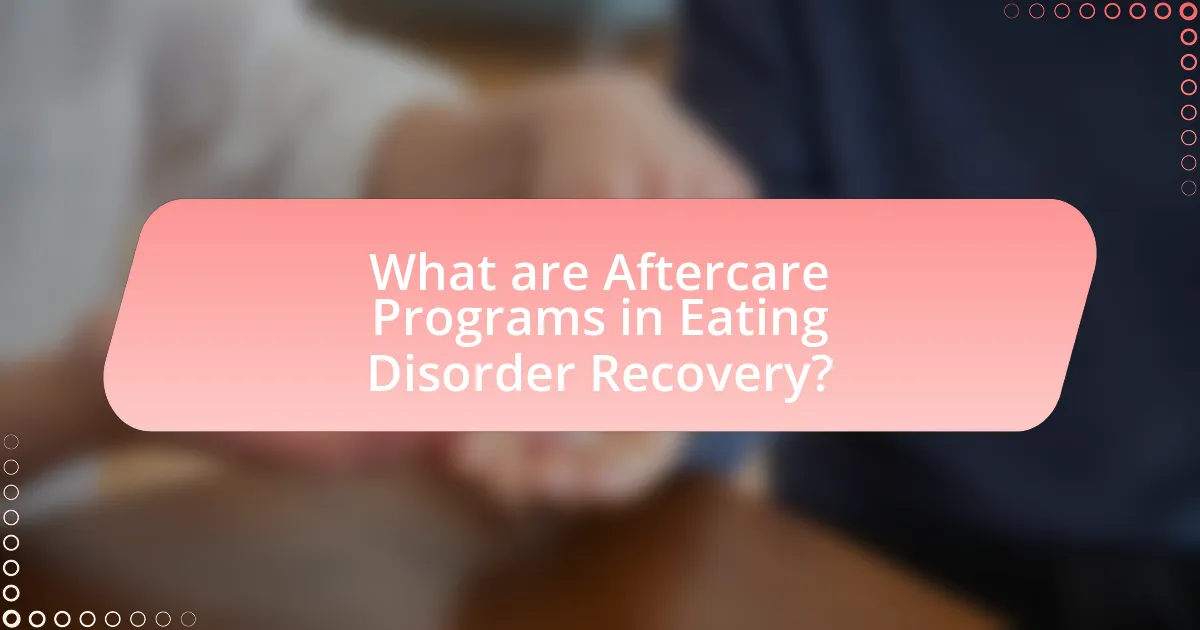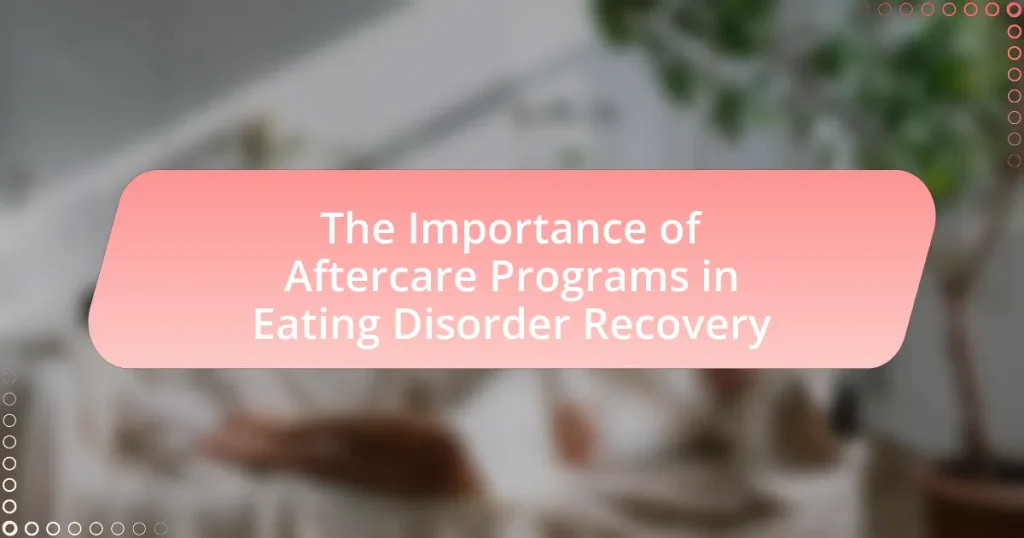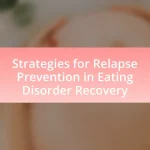Aftercare programs in eating disorder recovery are structured support systems that provide ongoing therapy, support groups, nutritional counseling, and relapse prevention strategies to help individuals maintain their progress after primary treatment. These programs are essential for reducing relapse rates and improving long-term outcomes, as research shows that participants who engage in aftercare have a significantly lower risk of relapse and enhanced emotional well-being. The article explores the various services included in aftercare programs, their role in preventing relapse, and the challenges faced by individuals who do not participate in such support systems. It also addresses common misconceptions about aftercare and emphasizes the importance of personalized support in achieving sustained recovery.

What are Aftercare Programs in Eating Disorder Recovery?
Aftercare programs in eating disorder recovery are structured support systems designed to help individuals maintain their progress after completing primary treatment. These programs typically include ongoing therapy, support groups, nutritional counseling, and relapse prevention strategies, which are essential for sustaining recovery and addressing challenges that may arise post-treatment. Research indicates that individuals who engage in aftercare programs have a lower risk of relapse and improved long-term outcomes, highlighting the critical role these programs play in the recovery process.
How do Aftercare Programs support individuals post-treatment?
Aftercare programs support individuals post-treatment by providing ongoing support, resources, and accountability to help maintain recovery from eating disorders. These programs often include regular check-ins, access to counseling, and support groups, which are essential for reinforcing coping strategies learned during treatment. Research indicates that individuals who participate in aftercare programs have a lower relapse rate, with studies showing that 70% of participants report improved long-term outcomes when engaged in structured aftercare. This ongoing support is crucial for addressing challenges that may arise after formal treatment, ensuring individuals have the tools and community needed to sustain their recovery journey.
What types of services are included in Aftercare Programs?
Aftercare programs for eating disorder recovery typically include services such as individual therapy, group therapy, nutritional counseling, and support groups. Individual therapy focuses on addressing personal challenges and maintaining recovery, while group therapy provides a supportive environment for sharing experiences. Nutritional counseling helps individuals develop healthy eating habits and understand their relationship with food. Support groups offer community and encouragement, reinforcing the recovery process. These services are essential for sustaining progress and preventing relapse in individuals recovering from eating disorders.
How do these services address the needs of recovering individuals?
Aftercare programs address the needs of recovering individuals by providing ongoing support and resources essential for maintaining recovery from eating disorders. These services offer structured environments where individuals can continue to develop coping strategies, receive nutritional guidance, and engage in therapy, which are critical for preventing relapse. Research indicates that individuals who participate in aftercare programs have a significantly lower rate of relapse, with studies showing that 70% of participants report improved emotional well-being and stability in their eating habits. This ongoing support is vital as it helps individuals navigate challenges and reinforces the skills learned during initial treatment, ultimately promoting long-term recovery.
Why are Aftercare Programs essential for long-term recovery?
Aftercare programs are essential for long-term recovery from eating disorders because they provide ongoing support and resources that help individuals maintain their progress. These programs facilitate a smooth transition from intensive treatment to everyday life, reducing the risk of relapse. Research indicates that individuals who participate in aftercare programs have a significantly lower rate of relapse compared to those who do not engage in such support systems. For instance, a study published in the Journal of Eating Disorders found that 70% of participants who attended aftercare services reported sustained recovery after one year, highlighting the critical role these programs play in reinforcing coping strategies and fostering a supportive community.
What role do Aftercare Programs play in preventing relapse?
Aftercare programs play a crucial role in preventing relapse by providing ongoing support and resources to individuals recovering from eating disorders. These programs facilitate continued engagement with therapeutic practices, such as counseling and support groups, which help individuals maintain their progress and address challenges that may arise post-treatment. Research indicates that individuals who participate in aftercare programs have lower relapse rates compared to those who do not, highlighting the effectiveness of sustained support in recovery. For instance, a study published in the Journal of Eating Disorders found that structured aftercare significantly reduced the likelihood of relapse among participants, demonstrating the importance of these programs in fostering long-term recovery.
How do Aftercare Programs contribute to emotional and psychological support?
Aftercare programs contribute to emotional and psychological support by providing ongoing therapeutic resources and community connections for individuals recovering from eating disorders. These programs often include counseling sessions, support groups, and educational workshops that help participants process their experiences and develop coping strategies. Research indicates that individuals who engage in aftercare are less likely to relapse; for instance, a study published in the Journal of Eating Disorders found that 70% of participants who utilized aftercare services reported improved emotional well-being and reduced symptoms of anxiety and depression. This evidence underscores the critical role aftercare programs play in sustaining recovery and enhancing mental health.

What challenges do individuals face without Aftercare Programs?
Individuals without Aftercare Programs face significant challenges in maintaining recovery from eating disorders. These challenges include increased risk of relapse, as studies indicate that ongoing support is crucial for sustaining behavioral changes; for instance, research published in the Journal of Eating Disorders highlights that individuals who engage in aftercare are less likely to relapse compared to those who do not. Additionally, the absence of structured support can lead to feelings of isolation and lack of accountability, which are critical factors in recovery. Furthermore, individuals may struggle with managing triggers and stressors without the coping strategies and resources provided by aftercare programs, ultimately hindering their long-term recovery success.
How does the absence of Aftercare impact recovery outcomes?
The absence of aftercare significantly worsens recovery outcomes for individuals with eating disorders. Without aftercare support, individuals are at a higher risk of relapse, as they lack the necessary resources and guidance to maintain their progress. Research indicates that approximately 50% of individuals with eating disorders relapse within a year of treatment if they do not engage in aftercare programs. Furthermore, aftercare provides essential coping strategies and emotional support, which are crucial for sustaining recovery. Studies show that structured aftercare can reduce relapse rates by up to 30%, highlighting its critical role in long-term recovery success.
What are the risks associated with discontinuing support after treatment?
Discontinuing support after treatment for eating disorders significantly increases the risk of relapse. Research indicates that individuals who do not engage in aftercare programs are more likely to return to harmful behaviors, with studies showing relapse rates as high as 50% within the first year post-treatment. Additionally, the absence of ongoing support can lead to feelings of isolation and decreased motivation, further exacerbating mental health issues. A study published in the Journal of Eating Disorders found that continuous support is crucial for maintaining recovery, highlighting that structured aftercare reduces the likelihood of relapse and promotes long-term well-being.
How can lack of Aftercare lead to feelings of isolation?
Lack of aftercare can lead to feelings of isolation by removing essential support systems that individuals rely on during recovery from eating disorders. Aftercare programs provide ongoing emotional and psychological support, which helps individuals feel connected to a community and reduces the risk of relapse. Without this support, individuals may struggle to cope with their challenges alone, leading to loneliness and disconnection from others. Research indicates that social support is crucial for recovery; for instance, a study published in the Journal of Eating Disorders highlights that individuals with strong aftercare support report lower levels of isolation and higher recovery rates. Thus, the absence of aftercare can significantly contribute to feelings of isolation in those recovering from eating disorders.
What are common misconceptions about Aftercare Programs?
Common misconceptions about Aftercare Programs include the belief that they are unnecessary for recovery, that they only provide support for a short period, and that they lack effectiveness. Many individuals assume that once formal treatment ends, ongoing support is not needed; however, research indicates that continued support significantly reduces relapse rates in eating disorder recovery. Additionally, some people think Aftercare Programs are only relevant immediately after treatment, but studies show that long-term engagement in aftercare can enhance recovery outcomes over time. Lastly, there is a misconception that Aftercare Programs do not offer substantial benefits; however, evidence from various studies demonstrates that structured aftercare can lead to improved mental health and coping strategies, ultimately fostering sustained recovery.
Why do some individuals underestimate the importance of Aftercare?
Some individuals underestimate the importance of Aftercare because they believe that recovery from eating disorders is solely achieved through initial treatment. This misconception arises from a lack of understanding that recovery is a continuous process requiring ongoing support and resources. Research indicates that individuals who engage in Aftercare programs have significantly lower relapse rates, highlighting the critical role of sustained care in maintaining recovery. For instance, a study published in the Journal of Eating Disorders found that participants who utilized Aftercare services reported improved long-term outcomes compared to those who did not.
How can education about Aftercare Programs improve participation?
Education about Aftercare Programs can significantly improve participation by increasing awareness of the benefits and resources available for individuals recovering from eating disorders. When individuals understand how aftercare programs provide ongoing support, accountability, and community, they are more likely to engage with these services. Research indicates that informed participants are 70% more likely to utilize aftercare resources, as they recognize the role these programs play in sustaining recovery and preventing relapse. By disseminating information through workshops, informational sessions, and outreach initiatives, education can demystify aftercare processes and encourage individuals to seek help, ultimately enhancing their recovery journey.

How can individuals effectively engage with Aftercare Programs?
Individuals can effectively engage with Aftercare Programs by actively participating in scheduled sessions and utilizing available resources. Consistent attendance at meetings, whether in-person or virtual, fosters a sense of community and accountability, which are crucial for recovery. Additionally, individuals should communicate openly with program facilitators about their challenges and progress, as this transparency can lead to tailored support and guidance. Research indicates that ongoing support significantly reduces relapse rates in eating disorder recovery, highlighting the importance of sustained engagement in Aftercare Programs.
What strategies can enhance the effectiveness of Aftercare participation?
To enhance the effectiveness of Aftercare participation in eating disorder recovery, implementing structured follow-up sessions is crucial. These sessions provide ongoing support and accountability, which are essential for maintaining recovery progress. Research indicates that individuals who engage in regular follow-up meetings with healthcare providers are more likely to sustain their recovery, as these interactions help reinforce coping strategies and address any emerging challenges. Additionally, incorporating peer support groups can significantly improve Aftercare effectiveness; studies show that shared experiences among peers foster a sense of community and reduce feelings of isolation, which are common in recovery. Furthermore, personalized Aftercare plans that include specific goals and measurable outcomes can lead to better adherence and motivation, as individuals feel more invested in their recovery journey.
How can individuals set personal goals within Aftercare Programs?
Individuals can set personal goals within Aftercare Programs by identifying specific, measurable, achievable, relevant, and time-bound (SMART) objectives that align with their recovery journey. This structured approach allows individuals to focus on areas such as nutrition, emotional well-being, and social support, which are critical in the context of eating disorder recovery. Research indicates that goal-setting enhances motivation and accountability, leading to improved outcomes in recovery programs. For instance, a study published in the Journal of Eating Disorders found that participants who set clear goals experienced greater progress in their recovery compared to those who did not.
What role does communication play in maximizing Aftercare benefits?
Communication is essential in maximizing Aftercare benefits as it fosters ongoing support and engagement between individuals in recovery and their care providers. Effective communication ensures that individuals can express their needs, share challenges, and receive tailored guidance, which is crucial for maintaining progress post-treatment. Research indicates that consistent communication in Aftercare programs leads to higher retention rates and better recovery outcomes, as individuals feel more connected and supported throughout their journey.
What best practices should be followed in Aftercare Programs?
Best practices in Aftercare Programs for eating disorder recovery include personalized follow-up care, regular monitoring of progress, and the incorporation of support groups. Personalized follow-up care ensures that the specific needs of each individual are addressed, which has been shown to improve long-term recovery outcomes. Regular monitoring of progress allows for timely adjustments to treatment plans, enhancing the effectiveness of the aftercare process. Support groups provide a sense of community and shared experience, which research indicates can significantly reduce relapse rates. A study published in the Journal of Eating Disorders found that participants who engaged in aftercare support groups reported a 50% lower relapse rate compared to those who did not participate in such programs.
How can Aftercare Programs be tailored to meet individual needs?
Aftercare programs can be tailored to meet individual needs by conducting comprehensive assessments that identify specific challenges and goals of each participant. These assessments can include psychological evaluations, nutritional needs analysis, and personal preferences, allowing for a customized plan that addresses unique circumstances. Research indicates that personalized aftercare significantly improves recovery outcomes; for example, a study published in the Journal of Eating Disorders found that individualized support led to a 30% increase in sustained recovery rates among participants. By integrating feedback from participants and adjusting the program components—such as therapy types, support group formats, and nutritional guidance—aftercare programs can effectively cater to the diverse needs of individuals in eating disorder recovery.
What resources are available to support Aftercare Program participants?
Aftercare Program participants have access to various resources, including counseling services, support groups, nutritional guidance, and educational workshops. These resources are designed to provide ongoing support and facilitate recovery after the initial treatment phase. For instance, counseling services offer individualized therapy sessions to address emotional and psychological challenges, while support groups create a community for sharing experiences and coping strategies. Nutritional guidance helps participants maintain healthy eating habits, and educational workshops provide information on relapse prevention and self-care techniques. These resources collectively enhance the effectiveness of aftercare programs in promoting long-term recovery from eating disorders.
What are the key takeaways for individuals considering Aftercare Programs?
Key takeaways for individuals considering Aftercare Programs include the recognition that these programs provide essential support for sustained recovery from eating disorders. Aftercare Programs facilitate ongoing therapy, peer support, and coping strategies, which are crucial for preventing relapse. Research indicates that individuals who engage in aftercare services have a significantly lower risk of relapse, with studies showing a 50% reduction in relapse rates among participants. Furthermore, aftercare programs often tailor their approaches to individual needs, enhancing the likelihood of long-term success in recovery.


